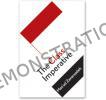The Class Imperative
Keywords:
Culture, DialecticsSynopsis
In The Class Imperative, Mas’ud Zavarzadeh argues that, far from having vanished, class remains the determining condition of social and individual life. Class has, however, been rendered invisible by the representation of capitalism as a series of discontinuous fields of activity, in which the historical domination of one class by another is obscured and social and economic divisions are cynically depicted as the product of differing individual capacities.
In one of its more pervasive recent theoretical formulations, capitalism isportrayed as having replaced industrial labour—which produces the means of social life—with immaterial labour, which is represented as producing social life itself. All activities are then viewed as labour, and the line that separates labour from life is blurred. When everyone is deemed to be a worker, the end of the “working class” can be declared, inasmuch as class conflicts are no longer perceived to exist. But, as Zavarzadeh demonstrates, there is nothing new in this new capitalism. Capitalism merely innovates, constantly developing new strategies to perpetuate the exploitation of working people.
In a provocative analysis, Zavarzadeh shows how contemporary cultural theory is complicit in the creation of an interpretive cultural unconscious that leads people to view capitalism and its demands as laws of nature and to regard inequalities as normal. The humanities, he argues, must develop pedagogical approaches that undo this seemingly instinctive acceptance of capitalism as a natural state and make visible the working of class in daily life. Change will become possible only through the inculcation of a critical class consciousness capable of grasping the everyday in relation to its historical roots. The Class Imperative aims to ignite this change.


